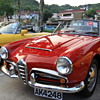Posted 11 years ago
 Chrisnp
Chrisnp
(310 items)
Here are my two German model 1898 rifles, one WWI production and one pre-war production. I try not to over-use the word “iconic” but this is another time it fits. Although primarily known as the German Empire’s main battle rifle during WWI, it is also one of the most copied firearms designs and arguably designer Paul Mauser’s crowning achievement. It has a solid reputation as a reliable, smooth handling and accurate rifle, although it’s length made it awkward in trench warfare, and its 400 meter minimum sight setting created problems shooting at an enemy less than 100 meters away. Its successor, the famous 98K (K=Kurz, meaning “short”) addressed those problems, replacing the Gew 98 in 1935.
My pre-war Gew 98 is marked on the receiver “DEUTSCHE WAFFEN UND MUNITIONSFABRIKEN BERLIN” (German Arms and Munitions Manufactory, Berlin) and the date of manufacture, 1902 – makes it a relatively early example. It was originally made for the round nosed 8mm 1888 ammunition used in the Gew 88 Commission rifle, but has been modified to accept the improved 8mm Spitzer ammunition that came out in 1905. The sling, which came with the rifle, is in “parade” position, meaning it’s attached in front of the trigger guard and clipped to a hook on the nose cap. It can be unclipped and reattached to the stock for slinging arms. I believe this particular sling is post-war and possibly third country manufacture, but it’s configured for the Gew 98.
My wartime Gew 98 receiver bears the crown of the Imperial Arsenal at Danzig, and the date of manufacture, 1915. The most obvious difference is that the metal did not undergo a bluing process, but was left “in the white” to simplify manufacture. On close examination I can find tool marks that do not appear on my pre-war example, evidence of less time in the finishing shop. This rifle also bears the “S” for Spitzer ammunition, but would have been originally manufactured for it. In spite of the experience of the first months of the war, it still retains the humped rear sight that goes from 400 to 2000 meters –which conformed to military thought before the war. The sling, which also came with the rifle, attaches to a standard sling swivel in the stock, which may be a post-war modification. Although a steel clip has been added to hook the sling to the nose cap, I believe this particular sling is third country. The shape of the very un-German brass buckle makes me suspect this is a Finnish accessory, as they acquired many of these post-war.
Ammo: German military Ball ammo of the time had a .323” diameter, 198 grain boat tail spire point bullet traveling at 2476 feet per second. I’ve tried a number of loads with using 200 grain Sierra HPBT match bullets, and have shot 3” groups with the 1902 rifle, hitting the bull’s eye at 100 yards on a machine rest by aiming at the top of the berm directly below the bulls eye. I get about a 4 ½” group out of my 1915 rifle.
WARNING: Load data is provided for information only. Many vintage firearms are unsafe to shoot and I do not advise use of this load data for other firearms since I do not know the specific firearm that may be involved or its condition.


















Wonderful again! .323 is just a "mit" over 8 m/m by my scale. Good accuracy at that range & surprising in an off-the-line infantry rifle.
Trying to get the Commissioner of the dutch police to start reloading here so I can get all this reloading equip. out of my garage & put to good use. Got 17 lbs of powder sitting on the French side (not exactly legally) & don't know what to do with it.
Are you reloading for this? 3031, 4227 or what?
In regards to the "mit", blunder- You know how it is, nomenclature seldom reflects true diameter.
I didn't post a load with this rifle because I couldn't tell from my poorly kept records what worked best. I try to closely match bullet weight and velocity to the original rounds (safety of course overrides everything), but it looks like was still working up this load when I got distracted by some other project.
Right now the ammo I have on hand uses the 200 grain match bullets with 48 grains of 4350. I've used 3031 in other rifle calibers and I've used 4227 with a 170 grain bullet in 8mm.
Thanks for the love petey, MattyG, fortapache, officialfuel, blunder, AmberRose and geo26e.
Thanks for the info reply. Been over 40 yrs since I have reloaded & trying to get back in the lingo in case this works with the police here. If they agree, I'm not sure how to explain how 17 lbs of powder "magically" appears without any shipping evidence or permit. There are advantages to living on an island belonging to 2 diff. countries so it will work.
Thank you again for the history lesson. It is indeed an iconic rifle.
Thanks for the love tlmbaran, petey, MattyG, fortapache, officialfuel, blunder, AmberRose and geo26e.